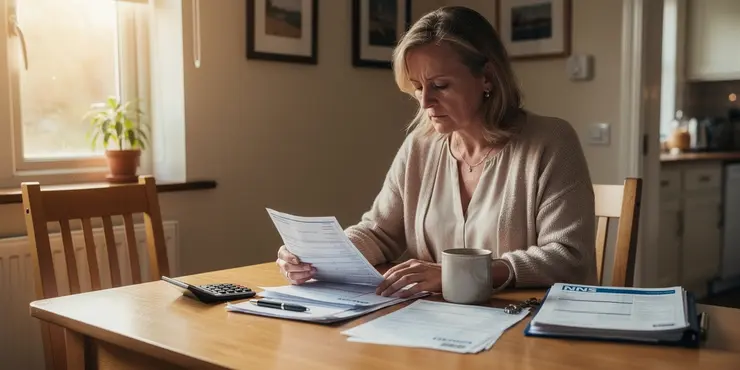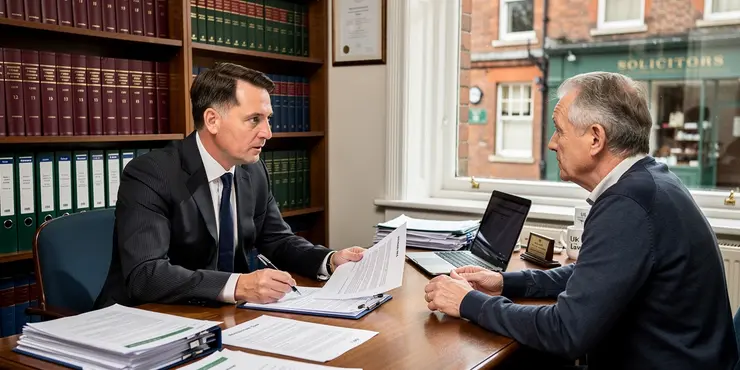
Find Help
More Items From Ergsy search
-

What taxes need to be paid from the deceased’s estate?
Relevance: 100%
-

Who is responsible for paying the deceased’s tax debts?
Relevance: 87%
-

Is it necessary to complete a final tax return for the deceased?
Relevance: 84%
-

Can the executor use the deceased's assets to pay tax debts?
Relevance: 84%
-

Is there a difference between inheritance tax and estate tax?
Relevance: 82%
-

What happens to a deceased’s Income Tax if they were employed?
Relevance: 80%
-

What should I do if I need help managing the tax affairs of the deceased?
Relevance: 79%
-

How do I value the estate for Inheritance Tax purposes?
Relevance: 77%
-

Is real estate included in wealth tax calculations?
Relevance: 67%
-

Are beneficiaries responsible for the deceased's tax debts?
Relevance: 62%
-

What Happens to Tax Debt After Death? (UK Laws)
Relevance: 61%
-

What if the estate does not have enough assets to pay all tax debts?
Relevance: 60%
-

What is the role of an executor in handling tax debts?
Relevance: 58%
-

What is Inheritance Tax?
Relevance: 56%
-

Who is responsible for paying Inheritance Tax?
Relevance: 56%
-

What assets are subject to inheritance tax?
Relevance: 56%
-

What is Inheritance Tax?
Relevance: 55%
-

When is inheritance tax due?
Relevance: 55%
-

Which countries impose inheritance tax?
Relevance: 55%
-

What is the process for paying inheritance tax?
Relevance: 55%
-

What is inheritance tax?
Relevance: 54%
-

How is the Inheritance Tax bill calculated?
Relevance: 54%
-

What forms do I need to complete for Inheritance Tax?
Relevance: 54%
-

When is inheritance tax due to be paid?
Relevance: 54%
-

Who pays the inheritance tax?
Relevance: 53%
-

How does inheritance tax affect charitable bequests?
Relevance: 53%
-

What is inheritance tax in the UK?
Relevance: 52%
-

How is inheritance tax calculated?
Relevance: 52%
-

How does inheritance tax affect life insurance policies?
Relevance: 51%
-

Do unpaid tax debts affect Inheritance Tax calculations?
Relevance: 51%
-

Wills, Probate and Tax Planning in the UK
Relevance: 51%
-

Are there any other reliefs available from inheritance tax?
Relevance: 50%
-

Does inheritance tax vary by state or region?
Relevance: 49%
-

How is Inheritance Tax (IHT) dealt with after death?
Relevance: 49%
-

How and when do I pay Inheritance Tax when someone has died?
Relevance: 49%
-

How does inheritance tax apply to life insurance policies?
Relevance: 48%
-

How do I notify HMRC of someone’s death?
Relevance: 48%
-

Are life insurance payouts subject to Inheritance Tax?
Relevance: 48%
-

Where can I find more detailed information on inheritance tax?
Relevance: 48%
-

Do spouses have to pay inheritance tax?
Relevance: 48%
Understanding Taxes on a Deceased’s Estate in the UK
When someone in the UK passes away, their estate may be subjected to various taxes before distribution to beneficiaries. The estate encompasses all the deceased's assets, including property, money, and personal belongings. It is crucial for executors to understand the taxes involved to ensure compliance with legal obligations. Here are the primary taxes that need to be considered.
Inheritance Tax (IHT)
Inheritance Tax is a major consideration when dealing with a deceased's estate. In the UK, this tax is charged on the value of the estate above a certain threshold. As of the 2023 tax year, the IHT threshold, or nil-rate band, is £325,000. Estates valued beyond this amount are taxed at 40%. However, several exemptions and reliefs exist. For instance, if a residence is left to direct descendants, the residence nil-rate band provides an additional threshold of £175,000. Moreover, transfers between spouses or civil partners are generally exempt from IHT.
Capital Gains Tax
Capital Gains Tax (CGT) applies when the deceased's assets have appreciated in value since the time of their purchase. While the transfer upon death itself doesn't incur CGT, its consideration arises if the executor sells assets before distribution. Any gain obtained from such a sale will attract CGT based on the difference between the sold value and the value at the time of death. It is important for executors to accurately calculate potential liabilities as they administer the estate.
Income Tax
Income Tax might also apply to the deceased's estate. If an estate generates income during the administration period — for instance, from dividends, investments, or property rent — this income can be liable for tax. Executors must file a tax return for the estate, accounting for any income received after the deceased's death. It is pertinent to calculate and pay this tax before distributing the estate to beneficiaries.
Probate Fees
Probate fees, while not a tax per se, constitute a necessary administrative expense in managing a deceased's estate in the UK. Probate is the process of legally establishing the validity of a will and executing an estate. Executors must pay fees to obtain a grant of probate, which generally varies based on the estate's total value. Currently, for estates worth more than £5,000, the probate fee is £273.
Conclusion
Dealing with a deceased’s estate in the UK involves careful consideration of various taxes and fees. Executors are advised to keep abreast of tax thresholds, reliefs, and legal obligations to effectively manage and distribute an estate. Consulting with a tax professional is often beneficial to navigate complex tax legislation and ensure compliance throughout the probate process.
Understanding Taxes on a Deceased’s Estate in the UK
When someone in the UK dies, their things (called an estate) may have to pay taxes before being given to family or friends. An estate is all the things the person owned, like their house, money, and belongings. The person who takes care of this (called an executor) needs to know about these taxes. Here are the main taxes they need to think about.
Inheritance Tax (IHT)
Inheritance Tax is important when sorting out someone’s estate. In the UK, this tax is on estates worth more than a certain amount. In 2023, this amount is £325,000. If the estate is worth more, it is taxed 40%. But, there are exceptions. For example, if a house is left to children or grandchildren, there is an extra amount of £175,000 that is not taxed. If things are passed between a husband and wife, or civil partners, there is usually no tax.
Capital Gains Tax
Capital Gains Tax is paid when the estate’s things have gone up in value since they were bought. This tax does not happen when the person dies, but if the executor sells things before giving them to others. The tax is based on how much more the things are worth now compared to when the person died. Executors need to figure out how much tax to pay when selling these things.
Income Tax
Income Tax could be due on the estate if it makes money after the person has died. For example, if the estate has property that earns rent or has investments, it might need to pay tax. Executors must do a tax return for the estate and pay any tax before giving out the estate's money and things.
Probate Fees
Probate fees are not a tax, but they are a cost for dealing with an estate in the UK. Probate is proving a will is real and sorting out the estate. Executors must pay these fees to get permission (called a grant of probate). The fee depends on how much the estate is worth. For estates worth more than £5,000, the fee is £273.
Conclusion
Sorting out a deceased person’s estate in the UK means thinking about different taxes and fees. Executors should know about tax rules to manage the estate right. Talking to a tax expert can help with understanding the rules and making sure everything is done correctly.
Frequently Asked Questions
What is an estate tax?
An estate tax is a tax on the right to transfer property at death.
Do all estates have to pay federal estate tax?
No, only estates that exceed the federal estate tax exclusion amount are subject to federal estate tax.
What is the federal estate tax exclusion amount for 2023?
The federal estate tax exclusion amount for 2023 is $12.92 million.
Are there any state estate taxes?
Yes, some states have their own estate or inheritance taxes with different exemption amounts.
What is an inheritance tax?
An inheritance tax is a tax imposed on individuals who receive property from a deceased person's estate.
Do I need to file an estate tax return?
You need to file an estate tax return if the gross estate is above the federal exclusion amount or if required by state law.
What is a 'gross estate'?
The gross estate includes all property owned by the decedent at the time of death, including real estate, bank accounts, and other assets.
Are life insurance proceeds taxable in an estate?
Life insurance proceeds could be included in the taxable estate if the decedent owned the policy.
How can estate taxes be minimized?
Estate taxes can be minimized through proper estate planning, such as using trusts, gifting strategies, and other legal methods.
What is a state inheritance tax?
A state inheritance tax is a tax that beneficiaries may have to pay on the value of what they inherit, depending on their relationship to the decedent.
Are there deductions available to reduce the gross estate?
Yes, deductions such as debts, funeral expenses, and bequests to a surviving spouse or charities can reduce the gross estate.
What is the due date for filing a federal estate tax return?
A federal estate tax return is generally due nine months from the date of the decedent's death.
Can extensions be obtained for filing estate tax returns?
Yes, extensions can be requested for filing estate tax returns, usually up to six additional months.
What happens if estate taxes are not paid on time?
Penalties and interest may be assessed if estate taxes are not paid by the due date.
Who is responsible for paying estate taxes?
The estate executor or administrator is responsible for ensuring estate taxes are paid.
What forms are used for federal estate tax filing?
Form 706 is used to file federal estate taxes.
Is there a gift tax related to estate taxes?
Yes, the gift tax is related to estate taxes, as they both share a unified credit limit.
Can charitable donations from the estate reduce estate taxes?
Yes, charitable donations made by the estate can reduce both state and federal estate taxes.
What is a marital deduction in the context of estate taxes?
A marital deduction is an unlimited deduction allowing the transfer of assets to a surviving spouse without incurring estate tax.
How can agricultural or family-owned properties affect estate taxes?
Special use valuation can reduce the estate tax burden on agricultural or closely-held family business properties.
What is an estate tax?
An estate tax is money that needs to be paid when a person dies and leaves things like money, houses, or land to others. This tax is taken from what they leave behind.
Here is a simple way to think about it:
- When someone dies, all the things they own are called their "estate."
- The government says some of this estate must be paid as a tax.
- This means some money goes to the government before people get what was left for them.
A good way to understand more is by looking at pictures or videos about estate tax.
Ask someone you trust, like a family member or a teacher, to help explain.
An estate tax is money that needs to be paid to the government when someone dies and gives their things to someone else.
Do all estates have to pay federal estate tax?
No, not every estate has to pay federal estate tax. Only big estates might need to pay. This means estates with a lot of money or things that are worth a lot.
You can ask someone who knows taxes, like an accountant, to help you understand more.
No, only big estates that are worth a lot of money have to pay a special tax called the federal estate tax.
How much money can you leave when you die without paying tax in 2023?
In 2023, you don't have to pay taxes on an estate if it is worth less than $12.92 million.
Do states have taxes on money or things you leave when you die?
Yes, some states make you pay extra taxes when someone dies. These are called estate or inheritance taxes. Each state might have different rules for when you need to pay these taxes.
What is an inheritance tax?
An inheritance tax is a tax that people might have to pay when they receive money or things after someone dies.
Here are some tips to make it easier to understand:
- Think about it like this: When a person dies and leaves you money or things, you might have to pay some of that money to the government as a tax.
- You can ask a family member or a helper to explain more if you are confused.
- Use pictures or drawings to help you understand what taxes mean.
An inheritance tax is money you must pay when you get things, like money or property, from someone who has died.
Do I need to fill out an estate tax form?
If someone dies and leaves money or things, their family might have to fill out a tax form. This is called an "estate tax form."
Here are some questions to help you know if you need to fill out this form:
- Did the person who died leave a lot of money or things?
- Does the law say you need to fill out the form for the amount they left?
If you are not sure, you can ask someone who knows about taxes, like a tax helper, to help you. Websites with tax information might also help. Using a calculator might make it easier to see if you need to fill out the tax form.
You need to fill out an estate tax form if the total value of what someone owned is more than the amount allowed by the government or if your state says you have to.
What is a 'gross estate'?
A 'gross estate' is all the stuff someone owned when they died. This can include things like their house, money, and other valuable items.
If you find this hard to understand, you can:
- Ask someone to help explain it to you.
- Use pictures to see what a 'gross estate' might look like.
- Break down the words into smaller parts to understand each one.
The gross estate means everything a person owns when they pass away. This includes things like houses, money in the bank, and other valuable things.
If reading is hard, you can use tools that read the words out loud for you. Try breaking the text into smaller parts, and take your time to understand each one.
Do you have to pay taxes on life insurance money when someone dies?
If a person who passed away owned a life insurance policy, the money from that policy might be taxed.
How to pay less estate tax?
Estate tax is money you pay when you get things after someone dies. You can pay less by planning.
Here are some tips:
- Give gifts while alive: You can give money or things now. This lowers what you have later.
- Make a trust: Put things in a trust. A trust is like a special box that helps save on tax.
- Get advice: Talk to experts. They know how to help you pay less tax.
Helpful tools:
- Picture guides: Use pictures with words.
- Ask someone: Talk with family or friends.
You can pay less estate tax by planning well. You can use things like trusts, giving gifts, and other legal ways to help you.
What is a state inheritance tax?
A state inheritance tax is money you pay when you get something after someone dies. It is like a bill from the state.
Here are some tips to help understand it:
- Use simple words. Talk with family or friends.
- Ask a helper, like a teacher or support worker, to explain.
- Use pictures or drawings to show what happens.
A state inheritance tax is money that people might have to pay when they receive something after someone else dies. How much they pay can depend on how they were related to the person who died.
Can you take away any costs to make the estate smaller?
Yes, certain things can make the total value of what someone leaves behind smaller. These include debts they owe, costs for their funeral, and gifts they leave to a husband or wife who's still alive or to charities.
You can use tools like picture dictionaries or reading guides to help understand this better.
When do you need to send a federal estate tax return?
If someone has died and their estate owes tax, you need to send a form to the government. This form is called a federal estate tax return.
The due date is: 9 months after the person dies.
Tip: You can use a calendar to mark this date and set reminders. If you're not sure, ask an adult who knows about taxes.
You need to send in a federal estate tax return. This is a form about money after someone dies.
Usually, you have 9 months to do this after the person dies.
Can you have more time to file estate tax papers?
You can ask for more time to fill out estate tax forms. Usually, you can get up to six more months to do this.
What if you don't pay estate taxes on time?
If you don't pay estate taxes when you should, there can be problems. You might have to pay extra money. This is called a penalty. It is like a fine or a fee.
You might also have to pay interest. This means more money is added on top of what you already owe. It makes the total bill larger.
If you need help, you can use a calculator. It helps you figure out how much you owe. You can also ask someone who knows about taxes to help you. They can give you advice to make sure you pay on time.
If you don't pay your estate taxes on time, you might have to pay extra money called penalties and interest.
Who pays the taxes when someone dies?
The person in charge of looking after someone's things after they pass away is called an executor or administrator. This person makes sure any taxes that are owed are paid.
What forms do you need to fill out for federal estate taxes?
Form 706 is a form you fill out to pay taxes when someone dies and leaves their things to others.
Do you have to pay gift tax when talking about estate taxes?
Yes, gift tax and estate taxes are linked because they both have a shared credit limit.
Can giving to charity after someone dies help reduce taxes?
Yes, giving money or things to charity from someone's estate can help lower the estate taxes that need to be paid to the government and the state.
What does 'marital deduction' mean for estate taxes?
'Marital deduction' is a tax rule. It helps when a person dies. It lets them give money or things to their husband or wife. This means they don’t pay taxes on this gift.
For help understanding:
- Use a dictionary for hard words.
- Ask someone for help if needed.
A marital deduction is a rule. It lets someone give all their things to their husband or wife when they die. They do not have to pay a special tax for this.
How do farms or family properties change estate taxes?
Some families have farms or land passed down from parents or grandparents. When someone dies, there may be taxes on what they leave behind for their family. This is called estate tax.
Farms or family land can change how much tax is paid. Sometimes, special rules can help pay less tax. It's important to understand these rules.
Families can talk to a tax expert or use online tools to learn more. This helps them make good choices about taxes.
Special use valuation can help lower the taxes on farms or family businesses when someone passes away.
Useful Links
This website offers general information and is not a substitute for professional advice.
Always seek guidance from qualified professionals.
If you have any medical concerns or need urgent help, contact a healthcare professional or emergency services immediately.
Some of this content was generated with AI assistance. We’ve done our best to keep it accurate, helpful, and human-friendly.
- Ergsy carfully checks the information in the videos we provide here.
- Videos shown by Youtube after a video has completed, have NOT been reviewed by ERGSY.
- To view, click the arrow in centre of video.
- Most of the videos you find here will have subtitles and/or closed captions available.
- You may need to turn these on, and choose your preferred language.
- Go to the video you'd like to watch.
- If closed captions (CC) are available, settings will be visible on the bottom right of the video player.
- To turn on Captions, click settings .
- To turn off Captions, click settings again.
More Items From Ergsy search
-

What taxes need to be paid from the deceased’s estate?
Relevance: 100%
-

Who is responsible for paying the deceased’s tax debts?
Relevance: 87%
-

Is it necessary to complete a final tax return for the deceased?
Relevance: 84%
-

Can the executor use the deceased's assets to pay tax debts?
Relevance: 84%
-

Is there a difference between inheritance tax and estate tax?
Relevance: 82%
-

What happens to a deceased’s Income Tax if they were employed?
Relevance: 80%
-

What should I do if I need help managing the tax affairs of the deceased?
Relevance: 79%
-

How do I value the estate for Inheritance Tax purposes?
Relevance: 77%
-

Is real estate included in wealth tax calculations?
Relevance: 67%
-

Are beneficiaries responsible for the deceased's tax debts?
Relevance: 62%
-

What Happens to Tax Debt After Death? (UK Laws)
Relevance: 61%
-

What if the estate does not have enough assets to pay all tax debts?
Relevance: 60%
-

What is the role of an executor in handling tax debts?
Relevance: 58%
-

What is Inheritance Tax?
Relevance: 56%
-

Who is responsible for paying Inheritance Tax?
Relevance: 56%
-

What assets are subject to inheritance tax?
Relevance: 56%
-

What is Inheritance Tax?
Relevance: 55%
-

When is inheritance tax due?
Relevance: 55%
-

Which countries impose inheritance tax?
Relevance: 55%
-

What is the process for paying inheritance tax?
Relevance: 55%
-

What is inheritance tax?
Relevance: 54%
-

How is the Inheritance Tax bill calculated?
Relevance: 54%
-

What forms do I need to complete for Inheritance Tax?
Relevance: 54%
-

When is inheritance tax due to be paid?
Relevance: 54%
-

Who pays the inheritance tax?
Relevance: 53%
-

How does inheritance tax affect charitable bequests?
Relevance: 53%
-

What is inheritance tax in the UK?
Relevance: 52%
-

How is inheritance tax calculated?
Relevance: 52%
-

How does inheritance tax affect life insurance policies?
Relevance: 51%
-

Do unpaid tax debts affect Inheritance Tax calculations?
Relevance: 51%
-

Wills, Probate and Tax Planning in the UK
Relevance: 51%
-

Are there any other reliefs available from inheritance tax?
Relevance: 50%
-

Does inheritance tax vary by state or region?
Relevance: 49%
-

How is Inheritance Tax (IHT) dealt with after death?
Relevance: 49%
-

How and when do I pay Inheritance Tax when someone has died?
Relevance: 49%
-

How does inheritance tax apply to life insurance policies?
Relevance: 48%
-

How do I notify HMRC of someone’s death?
Relevance: 48%
-

Are life insurance payouts subject to Inheritance Tax?
Relevance: 48%
-

Where can I find more detailed information on inheritance tax?
Relevance: 48%
-

Do spouses have to pay inheritance tax?
Relevance: 48%


